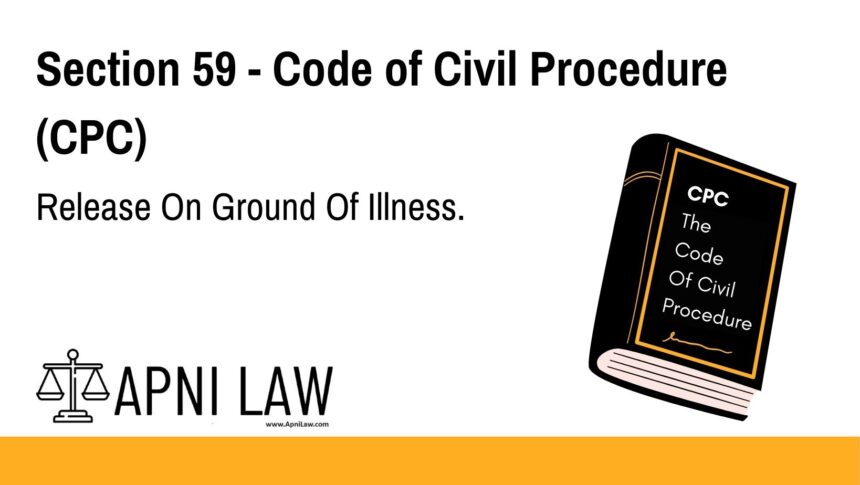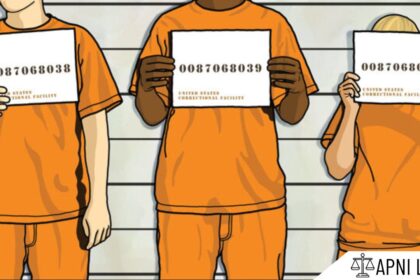Code
CPC(1) At any time after a warrant for the arrest of a judgment-debtor
has been issued the Court may cancel it on the ground of his serious illness.(2) Where a judgment-debtor has been arrested, the Court may release him if, in its opinion, he is not
in a fit state of health to be detained in the civil prison.(3) Where a judgment-debtor has been committed to the civil prison, he may be released therefrom–(a) by the State Government, on the ground of the existence of any infectious or contagious
disease, or(b) by the committing Court, or any Court to which that Court is subordinate, on the ground of his
suffering from any serious illness.(4) A judgment-debtor released under this section may be re-arrested, but the period of his detention
in civil prison shall not in the aggregate exceed that prescribed by section 58.
Excellent — this is Section 59 CPC, which deals with the release of judgment-debtors on health grounds. Let me format it properly.
Section 59 CPC: Release of Judgment-Debtor on Grounds of Illness
Code: Section 59 of the Civil Procedure Code
59. Release on ground of illness.
(1) At any time after a warrant for the arrest of a judgment-debtor has been issued, the Court may cancel it on the ground of his serious illness.
(2) Where a judgment-debtor has been arrested, the Court may release him if, in its opinion, he is not in a fit state of health to be detained in the civil prison.
(3) Where a judgment-debtor has been committed to the civil prison, he may be released therefrom—
(a) by the State Government, on the ground of the existence of any infectious or contagious disease, or
(b) by the committing Court, or any Court to which that Court is subordinate, on the ground of his suffering from any serious illness.
(4) A judgment-debtor released under this section may be re-arrested, but the period of his detention in civil prison shall not in the aggregate exceed that prescribed by section 58.
Explanation of Section 59 CPC
Section 59 CPC provides humanitarian safeguards for judgment-debtors who are ill or suffering from health conditions.
Key Points:
- Cancellation of Arrest Warrant:
- If a debtor is seriously ill before arrest, the Court may cancel the arrest warrant.
- Release After Arrest but Before Detention:
- If the debtor is arrested but unfit for imprisonment, the Court may release him immediately.
- Release After Committal to Prison:
- If already in civil prison, release may be granted:
- By the State Government → in case of infectious or contagious disease, to prevent spread.
- By the committing Court or superior Court → in case of serious illness.
- If already in civil prison, release may be granted:
- Re-Arrest Possible:
- A released debtor may be re-arrested after recovery.
- However, the total detention period cannot exceed the maximum fixed under Section 58 CPC (3 months or 6 weeks, depending on decree amount).
Thus, this section prioritizes public health and humane treatment, while still allowing the decree-holder’s rights to be preserved through re-arrest later.
Illustration
- Example 1:
A debtor with a heart condition has a warrant of arrest issued against him. The Court cancels the warrant under Section 59(1). - Example 2:
A debtor is arrested but develops serious illness before being committed to prison. The Court releases him under Section 59(2). - Example 3:
A debtor in civil prison contracts tuberculosis. The State Government orders his release under Section 59(3)(a). - Example 4:
A debtor is released due to illness but later recovers. He may be re-arrested, but total detention cannot exceed the limit under Section 58 CPC.
Common Questions and Answers
1. Who can release a judgment-debtor on health grounds?
- The Court can cancel the warrant or release him if already arrested.
- The State Government can release him from prison in case of infectious/contagious diseases.
- The Court (committing or superior) can release him for serious illness.
2. Can a debtor be re-arrested after release on illness grounds?
Yes, re-arrest is possible after recovery, but total detention cannot exceed limits in Section 58 CPC.
3. Why does the State Government get involved?
To protect public health, since contagious or infectious diseases in prisons could spread rapidly.
4. Does release due to illness discharge the debt?
No. The debtor still owes the money. Release only postpones imprisonment until health improves.
5. How does this section balance rights?
It protects debtor’s health and public health, while preserving creditor’s right to re-arrest within statutory limits.
Conclusion
Section 59 CPC ensures that seriously ill judgment-debtors are not subjected to inhumane imprisonment or forced to stay in unhealthy conditions. It allows flexibility by enabling Courts and the State Government to release debtors temporarily, while still safeguarding the decree-holder’s rights by permitting re-arrest later within the detention limits under Section 58 CPC.
For more on arrest and detention provisions under CPC, visit ApniLaw.








